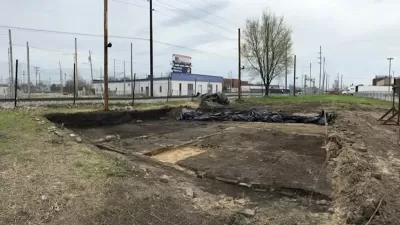Clare Foran unravels the relationship between misguided '70s-era planning efforts and ongoing racial tension in France.
A small town not far from the northern coast of France, Val-de-Reuil was established as one of nine New Towns intended to transform the overcrowding and suburban sprawl that plagued French cities in the late '60s and early '70s. Forty years on, however, it has yet to deliver on its promises.
"Today it’s one of the poorest cities in France," writes Foran, who formerly taught English there. "Rows of four and five-story, low-rent apartment complexes line the streets with balconies jutting out from their concrete facades... There is no discernible city center. The architecture of the buildings is modern, but not cutting edge and the city has a stark, uniform look to it. In a country that prides itself on history and tradition, Val-de-Reuil seems out of place – a town of boxy, geometric construction in the middle of the French countryside."
And while the reasons for its failure are worth considering (high unemployment due to industry-worker mismatch; a weak tax base due to socioeconomic segregation), more troubling is the way that such projects have reinforced racial tensions in a nation whose immigration policy is built on a platform of integration, "which calls for assimilation into French society, in speech, dress, culture, and custom."
"Val-de-Reuil isn’t a typical French town. To dismiss the city as an anomaly, however, would be a mistake. Val-de-Reuil embodies a central irony of French urban planning policy. City planners have built up isolated urban enclaves, like the Paris suburbs and the New Towns, which keep the country’s immigrant population separate from the rest of society, at the same time that the government calls for integration."
Foran recalls seeing these same tensions erupt in her own classroom, and hearing how minority children received them firsthand: "'You’re lucky that you live in the U.S.," [said one 12-year-old of Algerian descent]. 'Don’t you like living in France?' I asked. 'No,' he replied with grim certainty. 'People are racist here. They take one look and decide they don’t like you.'"
FULL STORY: How France Built Inequality Into Its Cities

Maui's Vacation Rental Debate Turns Ugly
Verbal attacks, misinformation campaigns and fistfights plague a high-stakes debate to convert thousands of vacation rentals into long-term housing.

Planetizen Federal Action Tracker
A weekly monitor of how Trump’s orders and actions are impacting planners and planning in America.

In Urban Planning, AI Prompting Could be the New Design Thinking
Creativity has long been key to great urban design. What if we see AI as our new creative partner?

King County Supportive Housing Program Offers Hope for Unhoused Residents
The county is taking a ‘Housing First’ approach that prioritizes getting people into housing, then offering wraparound supportive services.

Researchers Use AI to Get Clearer Picture of US Housing
Analysts are using artificial intelligence to supercharge their research by allowing them to comb through data faster. Though these AI tools can be error prone, they save time and housing researchers are optimistic about the future.

Making Shared Micromobility More Inclusive
Cities and shared mobility system operators can do more to include people with disabilities in planning and operations, per a new report.
Urban Design for Planners 1: Software Tools
This six-course series explores essential urban design concepts using open source software and equips planners with the tools they need to participate fully in the urban design process.
Planning for Universal Design
Learn the tools for implementing Universal Design in planning regulations.
planning NEXT
Appalachian Highlands Housing Partners
Mpact (founded as Rail~Volution)
City of Camden Redevelopment Agency
City of Astoria
City of Portland
City of Laramie





























